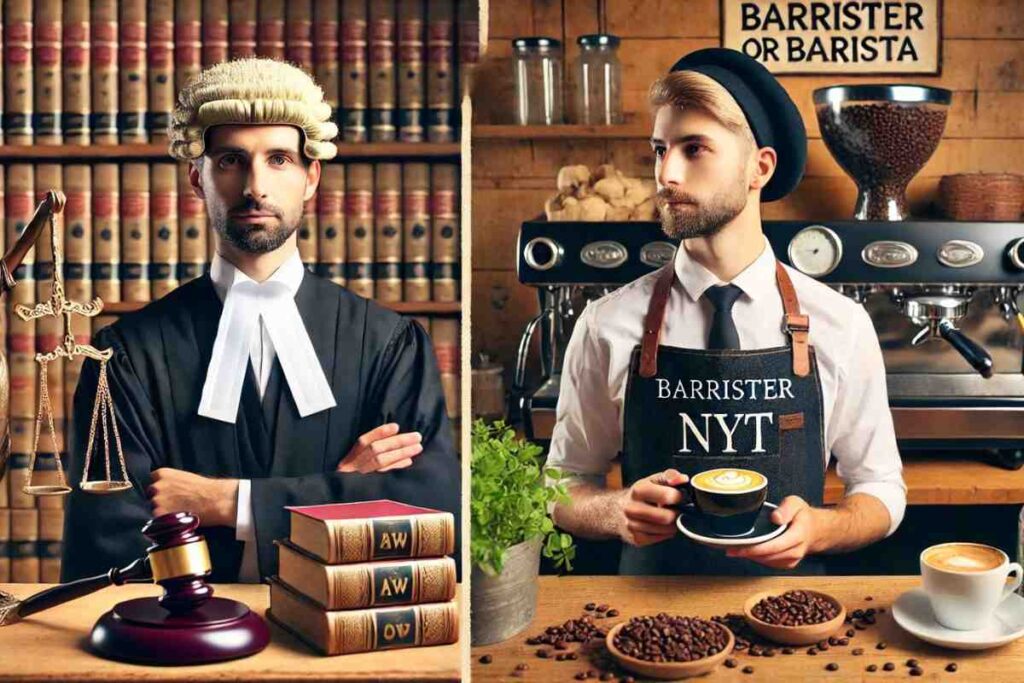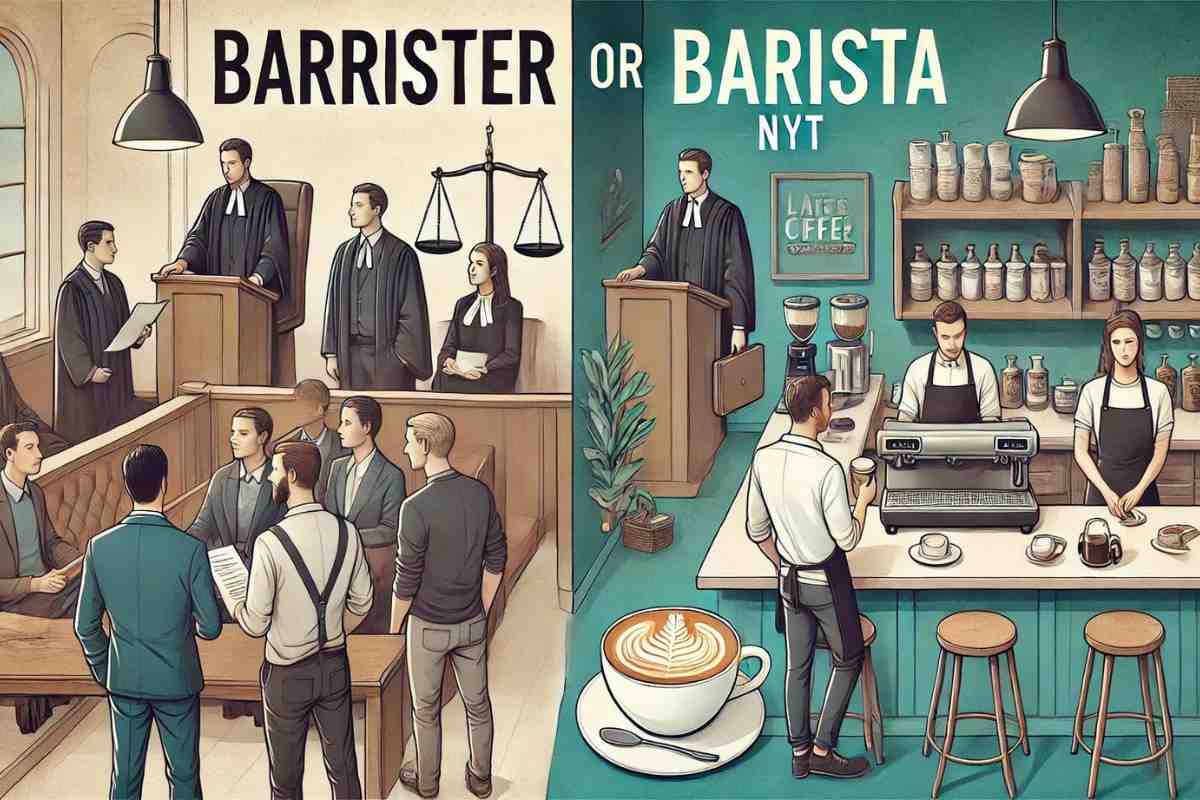- What Is A Barrister?
- What Is A Barista?
- Similarities And Differences In Daily Work Life About Barrister or Barista NYT
- Challenges Faced By Barrister Or Barista Nyt
- The Financial Aspect – Salary Comparison!
- The Crossover Between Law and Culinary Arts – Career Transition!
- Which Career Path Is Right For You?
- Conclusion
- FAQs
- What’s the main difference between a barrister and a barista?
- How long does it take to become a barrister compared to a barista?
- Can a barista become a barrister?
- Do both barristers and baristas need good communication skills?
- Do barristers and baristas have any similar skills?
- How can barristers and baristas move up in their careers?
- How is the work-life balance different between barristers and baristas?
- Have any lawyers become baristas or vice versa?
In the vibrant city of New York, where ambition and creativity flourish, the professions of barrister or barista nyt present fascinating yet contrasting career options.
At first glance, these two roles may appear worlds apartone immersed in legal jargon and the other focused on crafting the perfect cup of coffee.
This article delves into the intricate details of each profession, offering valuable insights into their requirements, daily lives, challenges, and potential rewards.
What Is A Barrister?

A barrister is a legal profession who specializes in courtroom advocacy, legal research, and case preparation.
They represent clients in legal matters, typically in higher courts, and are known for their expertise in presenting complex legal arguments.
Education
- Obtain a law degree or complete a conversion course if the undergraduate degree is in a different field.
- Pursue the Bar training course, which equips aspiring barristers with essential skills.
- Undergo pupillage, a practical training period working under an experienced barrister.
Skills Required
- Strong analytical and critical thinking abilities.
- Exceptional communication skills for articulating arguments clearly.
- Proficiency in legal research and understanding of complex legal principles.
Salary Expectations
According to recent data, barristers in New York can earn a salary ranging from $70,000 to over $200,000 annually, depending on experience and specialization .
What Is A Barista?
In contrast, a barista is a skilled profession who prepares and serves coffee beverages, often in busy coffee shops.
The role emphasizes customer service and the craft of coffee-making, appealing to those with a passion for culinary arts.
Education
- Many baristas start with a high school diploma; formal education is not a prerequisite.
- Training often occurs on the job, focusing on coffee preparation, customer service, and knowledge of brewing techniques.
Skills Required
- Excellent customer service and interpersonal skills.
- A keen understanding of coffee flavors and brewing methods.
- Ability to multitask and work efficiently in a fast-paced environment.
Salary Expectations
Baristas generally earn between $30,000 and $40,000 annually, with tips potentially increasing earnings significantly during busy shifts .
Similarities And Differences In Daily Work Life About Barrister or Barista NYT
Both barristers and baristas serve clients but in dramatically different environments.
Barristers’ Daily Work Life
- Courtroom Advocacy: Barristers spend a significant portion of their day preparing for court appearances, which includes researching legal precedents and developing case strategies.
- Client Meetings: They often meet with clients to discuss case details and legal options, requiring strong interpersonal skills to build trust.
- High-Pressure Environment: The stakes are high, as the outcomes of legal cases can significantly impact clients’ lives.
Baristas’ Daily Work Life
- Coffee Crafting: Baristas focus on preparing coffee drinks, engaging customers, and ensuring a pleasant experience in the café.
- Fast-Paced Environment: They must work efficiently during busy periods, particularly during morning rush hours and lunch breaks.
- Customer Interaction: Building rapport with customers is crucial for creating a welcoming atmosphere and encouraging repeat business.
Challenges Faced By Barrister Or Barista Nyt

Despite the differences in their professions, both barristers and baristas encounter unique challenges.
Challenges for Barristers
- High Stress Levels: The pressure to succeed in high-stakes cases can lead to stress and burnout, especially during trial preparation.
- Long Hours: Barristers often work extended hours to meet deadlines for court submissions and case research.
- Continuous Education: Staying updated with the latest legal developments is essential, requiring ongoing education and training.
Challenges for Baristas
- Fast-Paced Work Environment: The need to prepare drinks quickly during peak hours can lead to physical and mental exhaustion.
- Fluctuating Income: While tips can enhance earnings, they are often unpredictable, leading to income variability.
- Job Security: Economic downturns can affect café patronage, impacting job stability for baristas .
The Financial Aspect – Salary Comparison!
When comparing the salaries of barristers and baristas, the differences are stark. According to a report by the Bureau of Labor Statistics, lawyers including barristers earn significantly more than those in the culinary field.
In New York, experienced barristers can command salaries well into the six-figure range, whereas baristas generally earn a modest income, with opportunities for tips to supplement earnings .
Barristers
$70,000 – $200,000 annually, with some earning even more based on specialization and reputation.
Baristas
$30,000 – $40,000 annually, plus tips which can add several thousand dollars depending on location and customer volume.
The Crossover Between Law and Culinary Arts – Career Transition!
Interestingly, the worlds of law and culinary arts occasionally intersect. Some barristers have transitioned into culinary careers, finding fulfillment in cooking after navigating the complexities of legal briefs.
Conversely, chefs may find themselves intrigued by the nuances of contracts and business negotiations in the restaurant industry.
Skills Transfer
- Lawyers Turned Chefs: Often excel at managing high-stress situations, using their analytical skills to create unique dining experiences.
- Chefs in Law: Bring creative problem-solving skills to negotiations, enhancing their business acumen.
This crossover demonstrates that diverse experiences can enrich one’s proficiency, regardless of whether one wears a suit or an apron.
Which Career Path Is Right For You?

Choosing between a career as a barrister or barista depends on individual passions and lifestyle preferences. Here are some factors to consider:
Intellectual Challenges
A barrister’s path may be more appealing if you enjoy analytical thinking and complex problem-solving.
Customer Interaction
If you thrive in social environments and find joy in creating experiences for others, consider becoming a barista.
Conclusion
Barrister or Barista NYT offer unique challenges and rewards, making the choice between a barrister or barista a deeply personal one.
While the legal world demands long hours and analytical prowess, the culinary field encourages creativity and interpersonal connection.
Ultimately, success in either career hinges on aligning your interests with the demands of the profession.
Reflecting on what excites you whether it’s debating cases in court or perfecting latte art will guide you toward a fulfilling career path.
Each option presents opportunities for growth and personal fulfillment, inviting you to pursue your dreams wholeheartedly.
FAQs
What’s the main difference between a barrister and a barista?
The main difference is their work: a barrister is a lawyer who works in court, while a barista makes coffee in cafés. Barristers need years of legal training, while baristas usually learn on the job.
How long does it take to become a barrister compared to a barista?
To become a barrister, it can take around 5 to 7 years, including studying law and training. Becoming a barista takes much less time, usually just a few weeks to a few months of training.
Can a barista become a barrister?
Yes, a barista can become a barrister, but they would need to go back to school, study law, and complete the necessary training. It’s a long and challenging process.
Do both barristers and baristas need good communication skills?
Yes! Both need to communicate well. Barristers must explain legal ideas clearly in court, while baristas need to talk to customers and give great service.
Do barristers and baristas have any similar skills?
Even though they do different jobs, both need skills like time management and working well under pressure. Barristers deal with court deadlines, while baristas handle busy times in the café.
How can barristers and baristas move up in their careers?
Barristers can advance by becoming senior lawyers or even judges. Baristas can become café managers or start their own coffee shop if they want to run a business.
How is the work-life balance different between barristers and baristas?
Barristers often work long hours with high stress because of deadlines. Baristas usually work in shifts, which might give them more flexibility, but they often work on weekends and holidays.
Have any lawyers become baristas or vice versa?
Yes, some lawyers have switched careers and become baristas or opened coffee shops. Some baristas or chefs have also gone into law, especially to work on legal issues related to the food and restaurant industry.




